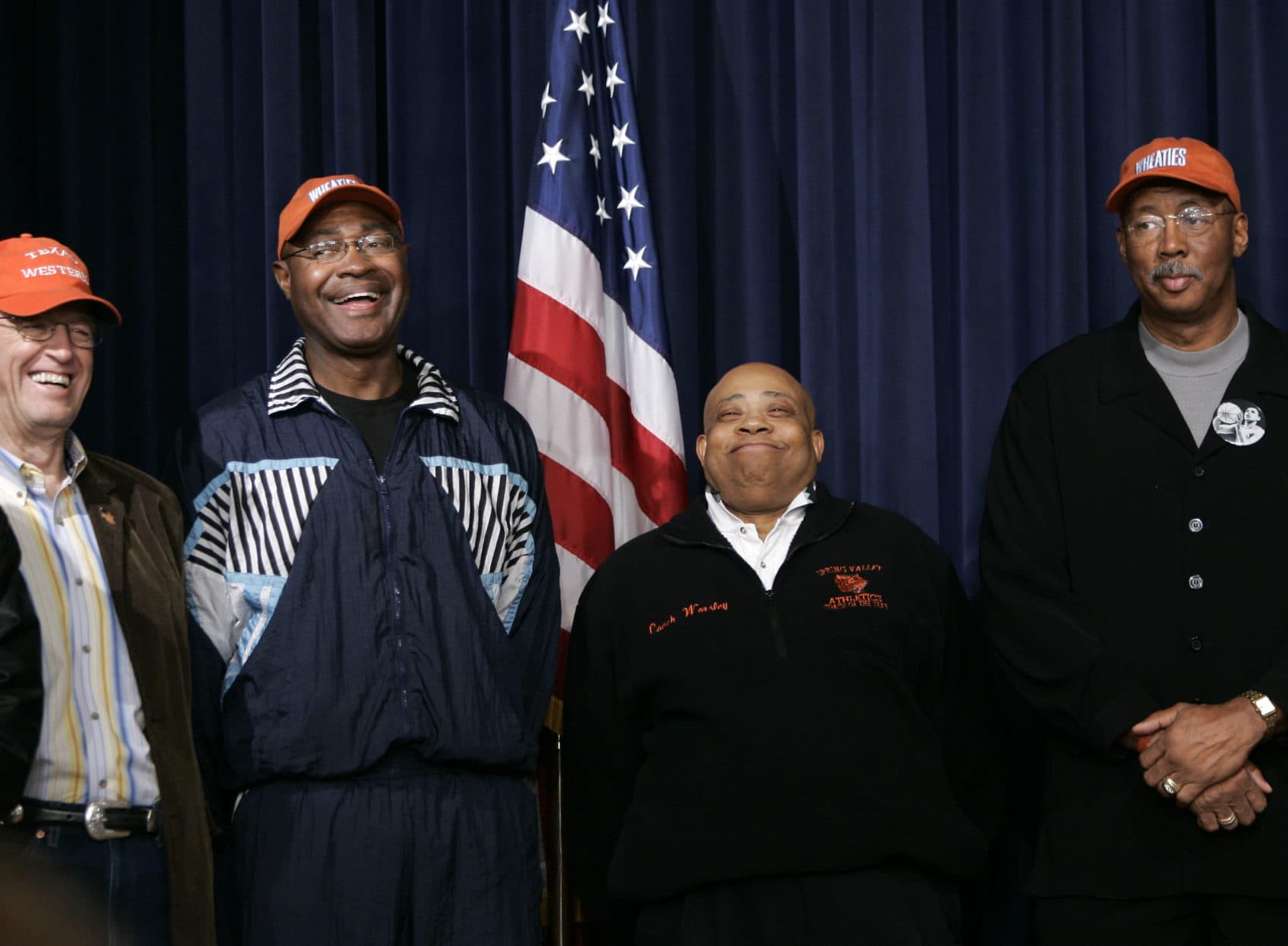Advertisement
The Story Behind A Rap About The 1966 Texas Western Team
On Mar. 19, 1966, Texas Western College and the University of Kentucky met in the men’s college basketball championship game.
It had been a year since the voting rights marches from Selma to Montgomery. Top-ranked Kentucky came from the segregated Southeastern Conference. All of their players were white. Texas Western, meanwhile, started five black players — a first for the NCAA title game.
After 40 minutes and a 20-point game from point guard Bobby Joe Hill, Texas Western — now the University of Texas at El Paso — had won, 72–65.
Three years ago, around the 50th anniversary of the game, President Barack Obama honored the team with a video tribute.
If that wasn’t enough, that 1966 Texas Western team is now celebrated in rap. The song was the result of an unlikely collaboration.
The University Of Texas At El Paso
Wide receiver Jean-André Moore walked onto the football team at Division I University of Texas at El Paso. He played for the Miners during the 2016 and 2017 seasons.
" ‘Played’ is a loose term," Jean-André says. "But I was on the team, yes. I mean, I was a practice guy. I love practicing."
"I changed the lyrics to ‘Mambo No. 5’ to talk about all the fish," Jean-André says. "So it's like, ‘A little bit of Coho in my life, a little bit of Chinook by my side, a little bit of rainbow's what I need.’ "
When his football career ended, Jean-André turned his focus to music. He got cast in a UTEP production of "A Chorus Line."
And around the same time, he received an email with a request from a guy he’d never met. The guy’s name was David Snell. And he wanted help making a rap.
What Jean-André didn't know was that David Snell was over 80 years old.
"No idea at all," Jean-André says. "No idea. Talking on the phone was the first time it clicked for me that, like, ‘Oh, I mean, he might be on the older end of things.' But I literally had no idea."
Advertisement
"82 years old. Right in the heart of rap country," David jokes.
(For the record, David's 82 now. But he would’ve been a spry 81 back when he first contacted Jean-André.)
David grew up in Michigan, the son of a Methodist minister and a stay-at-home mom. He always had a knack for writing what he calls "end-rhyme poetry."
"Our high school football team was bad," David says. "And so I wrote a thing for the Weekly Banner that said, ‘Win or lose, we're proud of youse. This poem is not so hot. But the reason why we're proud is because you gave it all you got.’ And you won't find that in the great poetry books of our time, any place. So you've got it exclusively."
In 1966, David started working at ABC News. He says he covered everything from Vietnam to Richard Nixon to Apollo missions.
He left ABC in 1979 and started working as a communications consultant. That’s how he met and became friends with a guy who’d been a manager for the 1966 Kentucky team that lost to Texas Western.
"And over a period of — well, I've known him for 30 years — I'd heard so many stories that I said, ‘There's gotta be a book in this,’ " David says.
'That Sounds Like A Rap'
David interviewed players from that 1966 Texas Western team. The Miners starting lineup in the title game was Bobby Joe Hill, David "Big Daddy D" Lattin, Willie Worsley, Harry Flournoy and Orsten Artis. Willie Cager and Nevil Shed came off the bench.
"And so, little by little, I had pieces of the poem running around in my head," David says. "Once I got to the first part, ‘They were something to see with Big Daddy D, with Harry, the Willies and O.’ It just started to flow in that way."
David’s book came out in 2016, and it was accompanied by a poem which he sent to the Texas Western players. He says they enjoyed it. He thought that was the end of it.

But after about a year passed — and with another college basketball season starting up — David thought about how he might be able to promote his book again.
"And then suddenly I thought, ‘Well, what can I do with that poem?’ " Snell says. " ‘Hmm. that kinda sounds like a rap.’ And I talked to my son. And he said, ‘Yeah, well, maybe.’ "
David didn’t know much about rap. But the idea stuck.
"Part of my interest in doing the whole thing was — whether it sells a book or not — I thought that there ought to be something that is there historically," Snell says. "That another 50 years down the road, someone might not — they might not pick up the book, but they might hear the rap. Who knows?"
So David started looking for someone who could do the job.
"As you might suspect, when an 82-year-old man starts looking for a rapper, he doesn't know quite where to look," David says.
Finally, he reached out to a friend in El Paso.
"He said, ‘Yeah, I've got just the guy,’ " David remembers.
And that guy was Jean-André Moore.
The Production
Now, Jean-André wasn’t a rapper. But he knew about the 1966 Texas Western team —and he was game to take on the project.
"When I read his words, it already had rhythm to it," Jean-André says. "Yeah, 'Let me tell you a story of a team of glory and the history that they made one day, when tiny Texas Western played mighty Kentucky to be the champions of the NCAA.' Like that's — it had flow."
Jean-André still had to come up with the chorus. For inspiration, he turned to some of the music he’d grown up listening to.
"I hadn't written a chorus myself before," Moore says. "And I kept listening to all these other things and was like, ‘Oh, you really just need to get something that can be repeated, like a mantra repeated, over and over and over again.’
"And so I was like — out in El Paso, people always call it the ’66 team. There's a bar actually across from UTEP called 'Spirit of ’66'. I was like, 'Oh, well, duh. Let’s just repeat that over and over again through the chorus and stuff.' So that's what clicked for me in there. And that was with the team of ’66, ’66, ’66, there was a team from ’66."
After he finished the song, he sent the audio to David.
"You know, what he did with it was just really good," David says says.
Jean-André thought that was maybe the end of the project. But David had more in mind: a music video.
"And he was like, 'Oh, we can do a video too,' " Jean-André says. "And I was like, 'Ah, we don’t have to do it — but if you want to do it, I guess we can do it.' "
David flew to El Paso. Jean-André’s girlfriend at the time shot the scenes on her iPhone.
"Once we got into it it was so fun honestly," Jean-André says.
"He comes across as a very strong performer," David says. "It's hard to believe that that's the first time he'd ever done anything like that."
Jean-André graduated from UTEP this past winter. He’s now working as an entertainer at a piano bar in Houston and pursuing a career in musical theater. He says he recently got cast in a production of "Mamma Mia."
And he says he’s glad he got to play a part in celebrating a proud moment in his alma mater’s history.
"The other part of it is, I mean, this is huge for civil rights," Jean-André says. "And for an African American like myself to go out there and get a chance to pay homage to these — gosh I’m getting welled up right here. That's crazy. To get a chance to show out for everyone else and show out for black culture is huge for me."
David Snell's book is "The Baron And The Bear: Rupp's Runts, Haskins' Miners And The Season That Changed Basketball Forever."
This segment aired on April 6, 2019.


